The Human Rights Act 1998: Upholding Patient Rights in Nursing
VerifiedAdded on 2023/04/26
|8
|1764
|154
Essay
AI Summary
This essay examines the Human Rights Act 1998 and its impact on nursing practice, emphasizing the importance of upholding patient rights. It discusses key aspects of the Act, including the right to life, freedom from degrading treatment, and the right to privacy. The essay highlights the significance of informed consent, autonomy, and justice in nursing, explaining how nurses can ensure these rights are respected in healthcare settings. It also addresses the concept of Gillick competence and the need to respect the decisions of competent children. Furthermore, the essay underscores the responsibility of healthcare organizations, including the NHS, to promote human rights and provides insights into how nurses can contribute to a human rights-based approach in service delivery, fostering patient satisfaction and ethical care.
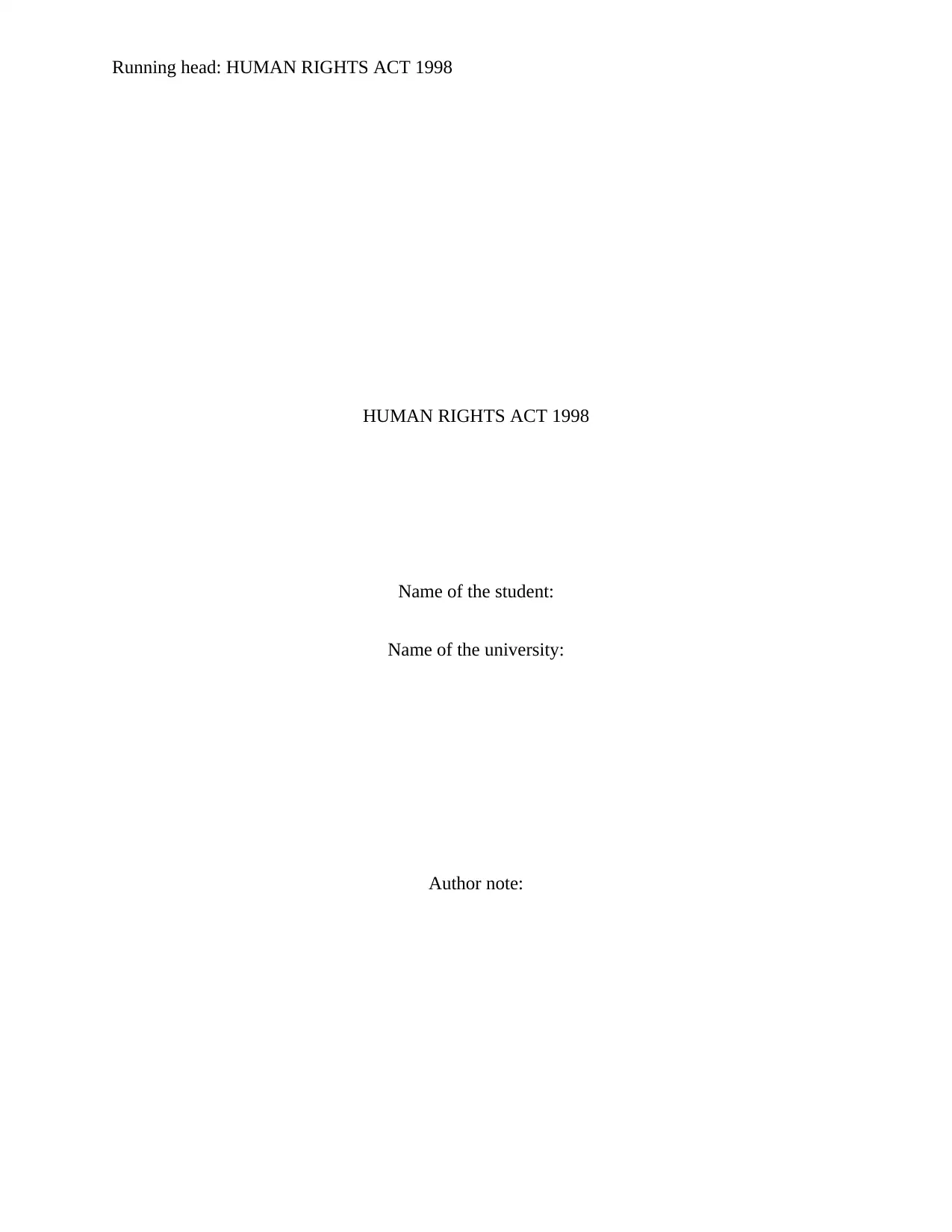
Running head: HUMAN RIGHTS ACT 1998
HUMAN RIGHTS ACT 1998
Name of the student:
Name of the university:
Author note:
HUMAN RIGHTS ACT 1998
Name of the student:
Name of the university:
Author note:
Paraphrase This Document
Need a fresh take? Get an instant paraphrase of this document with our AI Paraphraser
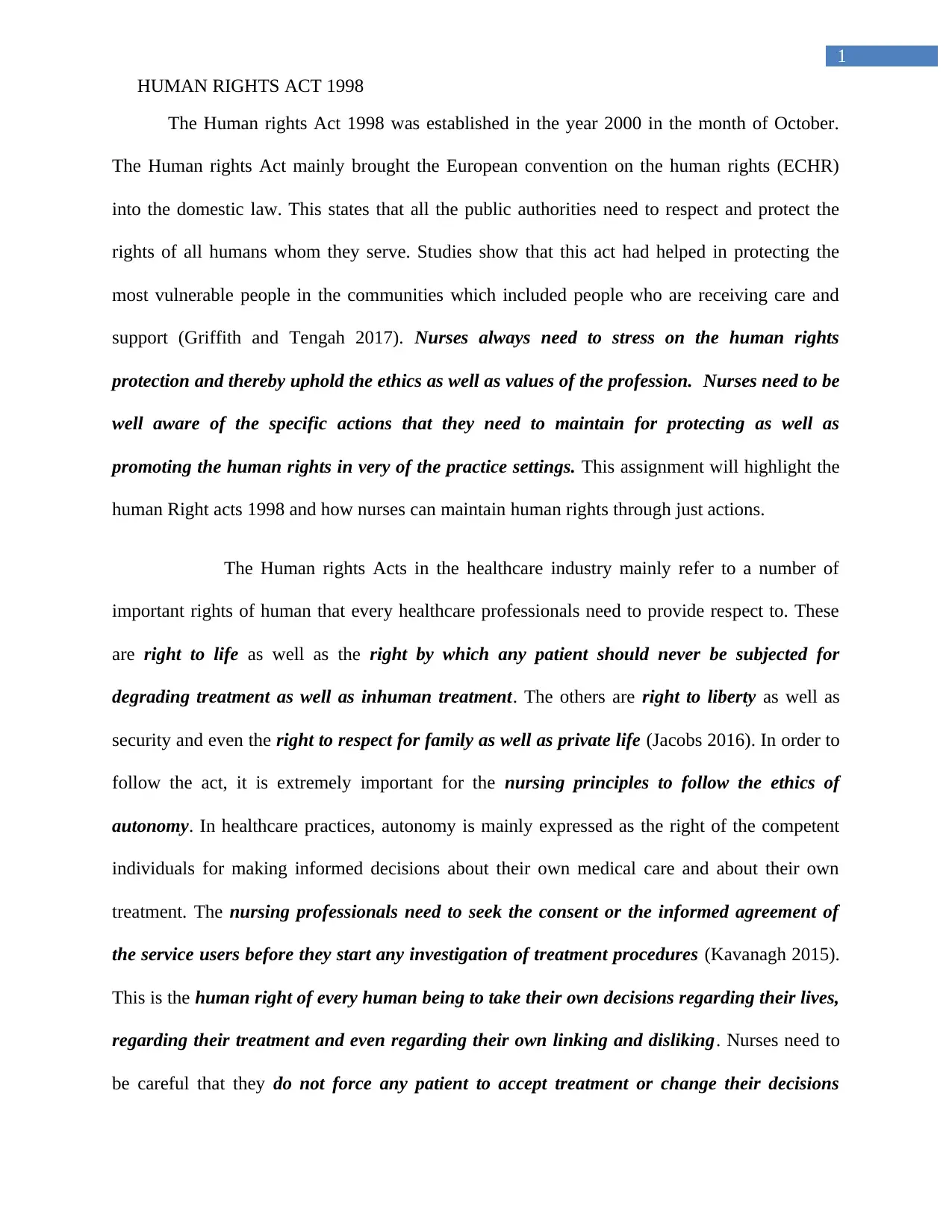
1
HUMAN RIGHTS ACT 1998
The Human rights Act 1998 was established in the year 2000 in the month of October.
The Human rights Act mainly brought the European convention on the human rights (ECHR)
into the domestic law. This states that all the public authorities need to respect and protect the
rights of all humans whom they serve. Studies show that this act had helped in protecting the
most vulnerable people in the communities which included people who are receiving care and
support (Griffith and Tengah 2017). Nurses always need to stress on the human rights
protection and thereby uphold the ethics as well as values of the profession. Nurses need to be
well aware of the specific actions that they need to maintain for protecting as well as
promoting the human rights in very of the practice settings. This assignment will highlight the
human Right acts 1998 and how nurses can maintain human rights through just actions.
The Human rights Acts in the healthcare industry mainly refer to a number of
important rights of human that every healthcare professionals need to provide respect to. These
are right to life as well as the right by which any patient should never be subjected for
degrading treatment as well as inhuman treatment. The others are right to liberty as well as
security and even the right to respect for family as well as private life (Jacobs 2016). In order to
follow the act, it is extremely important for the nursing principles to follow the ethics of
autonomy. In healthcare practices, autonomy is mainly expressed as the right of the competent
individuals for making informed decisions about their own medical care and about their own
treatment. The nursing professionals need to seek the consent or the informed agreement of
the service users before they start any investigation of treatment procedures (Kavanagh 2015).
This is the human right of every human being to take their own decisions regarding their lives,
regarding their treatment and even regarding their own linking and disliking. Nurses need to
be careful that they do not force any patient to accept treatment or change their decisions
HUMAN RIGHTS ACT 1998
The Human rights Act 1998 was established in the year 2000 in the month of October.
The Human rights Act mainly brought the European convention on the human rights (ECHR)
into the domestic law. This states that all the public authorities need to respect and protect the
rights of all humans whom they serve. Studies show that this act had helped in protecting the
most vulnerable people in the communities which included people who are receiving care and
support (Griffith and Tengah 2017). Nurses always need to stress on the human rights
protection and thereby uphold the ethics as well as values of the profession. Nurses need to be
well aware of the specific actions that they need to maintain for protecting as well as
promoting the human rights in very of the practice settings. This assignment will highlight the
human Right acts 1998 and how nurses can maintain human rights through just actions.
The Human rights Acts in the healthcare industry mainly refer to a number of
important rights of human that every healthcare professionals need to provide respect to. These
are right to life as well as the right by which any patient should never be subjected for
degrading treatment as well as inhuman treatment. The others are right to liberty as well as
security and even the right to respect for family as well as private life (Jacobs 2016). In order to
follow the act, it is extremely important for the nursing principles to follow the ethics of
autonomy. In healthcare practices, autonomy is mainly expressed as the right of the competent
individuals for making informed decisions about their own medical care and about their own
treatment. The nursing professionals need to seek the consent or the informed agreement of
the service users before they start any investigation of treatment procedures (Kavanagh 2015).
This is the human right of every human being to take their own decisions regarding their lives,
regarding their treatment and even regarding their own linking and disliking. Nurses need to
be careful that they do not force any patient to accept treatment or change their decisions
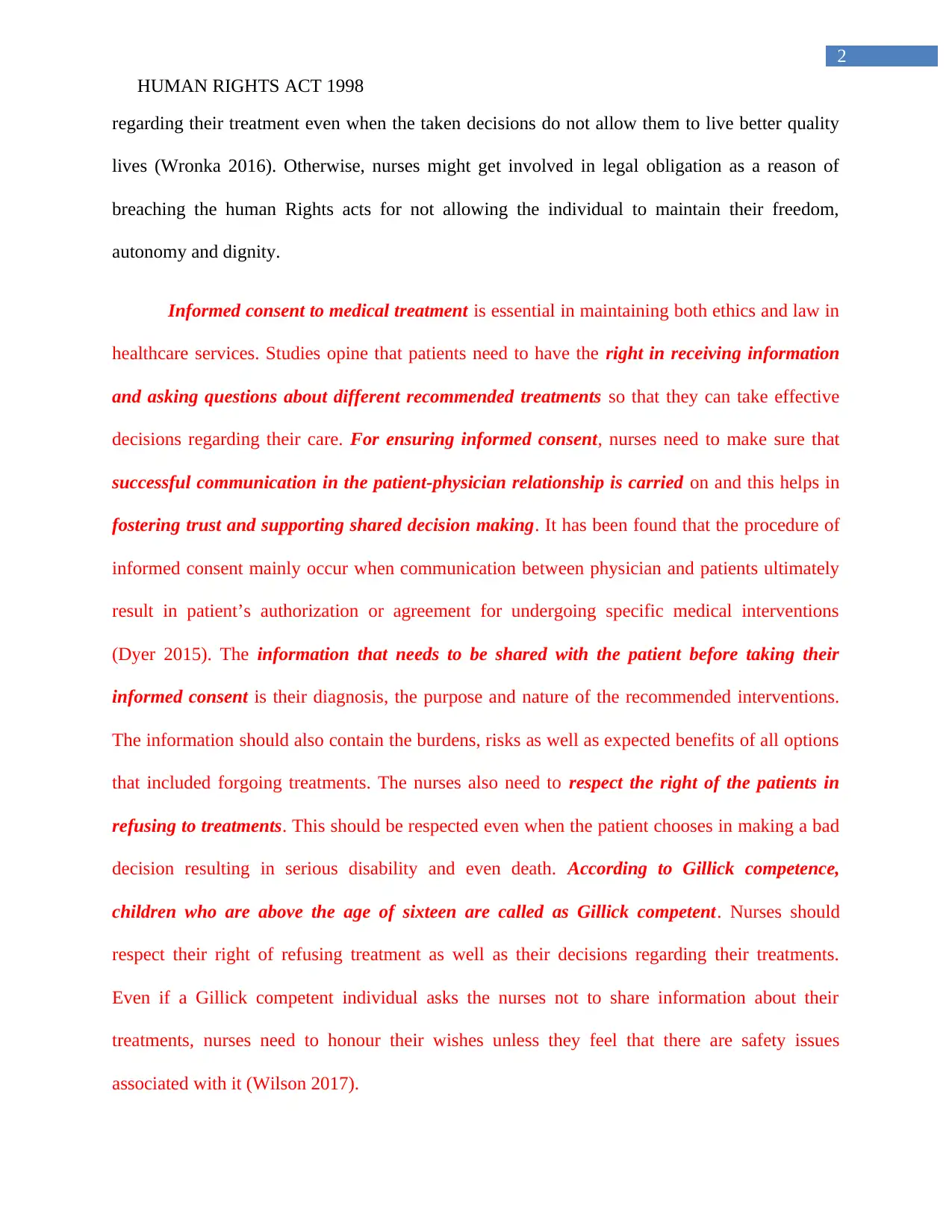
2
HUMAN RIGHTS ACT 1998
regarding their treatment even when the taken decisions do not allow them to live better quality
lives (Wronka 2016). Otherwise, nurses might get involved in legal obligation as a reason of
breaching the human Rights acts for not allowing the individual to maintain their freedom,
autonomy and dignity.
Informed consent to medical treatment is essential in maintaining both ethics and law in
healthcare services. Studies opine that patients need to have the right in receiving information
and asking questions about different recommended treatments so that they can take effective
decisions regarding their care. For ensuring informed consent, nurses need to make sure that
successful communication in the patient-physician relationship is carried on and this helps in
fostering trust and supporting shared decision making. It has been found that the procedure of
informed consent mainly occur when communication between physician and patients ultimately
result in patient’s authorization or agreement for undergoing specific medical interventions
(Dyer 2015). The information that needs to be shared with the patient before taking their
informed consent is their diagnosis, the purpose and nature of the recommended interventions.
The information should also contain the burdens, risks as well as expected benefits of all options
that included forgoing treatments. The nurses also need to respect the right of the patients in
refusing to treatments. This should be respected even when the patient chooses in making a bad
decision resulting in serious disability and even death. According to Gillick competence,
children who are above the age of sixteen are called as Gillick competent. Nurses should
respect their right of refusing treatment as well as their decisions regarding their treatments.
Even if a Gillick competent individual asks the nurses not to share information about their
treatments, nurses need to honour their wishes unless they feel that there are safety issues
associated with it (Wilson 2017).
HUMAN RIGHTS ACT 1998
regarding their treatment even when the taken decisions do not allow them to live better quality
lives (Wronka 2016). Otherwise, nurses might get involved in legal obligation as a reason of
breaching the human Rights acts for not allowing the individual to maintain their freedom,
autonomy and dignity.
Informed consent to medical treatment is essential in maintaining both ethics and law in
healthcare services. Studies opine that patients need to have the right in receiving information
and asking questions about different recommended treatments so that they can take effective
decisions regarding their care. For ensuring informed consent, nurses need to make sure that
successful communication in the patient-physician relationship is carried on and this helps in
fostering trust and supporting shared decision making. It has been found that the procedure of
informed consent mainly occur when communication between physician and patients ultimately
result in patient’s authorization or agreement for undergoing specific medical interventions
(Dyer 2015). The information that needs to be shared with the patient before taking their
informed consent is their diagnosis, the purpose and nature of the recommended interventions.
The information should also contain the burdens, risks as well as expected benefits of all options
that included forgoing treatments. The nurses also need to respect the right of the patients in
refusing to treatments. This should be respected even when the patient chooses in making a bad
decision resulting in serious disability and even death. According to Gillick competence,
children who are above the age of sixteen are called as Gillick competent. Nurses should
respect their right of refusing treatment as well as their decisions regarding their treatments.
Even if a Gillick competent individual asks the nurses not to share information about their
treatments, nurses need to honour their wishes unless they feel that there are safety issues
associated with it (Wilson 2017).
⊘ This is a preview!⊘
Do you want full access?
Subscribe today to unlock all pages.

Trusted by 1+ million students worldwide
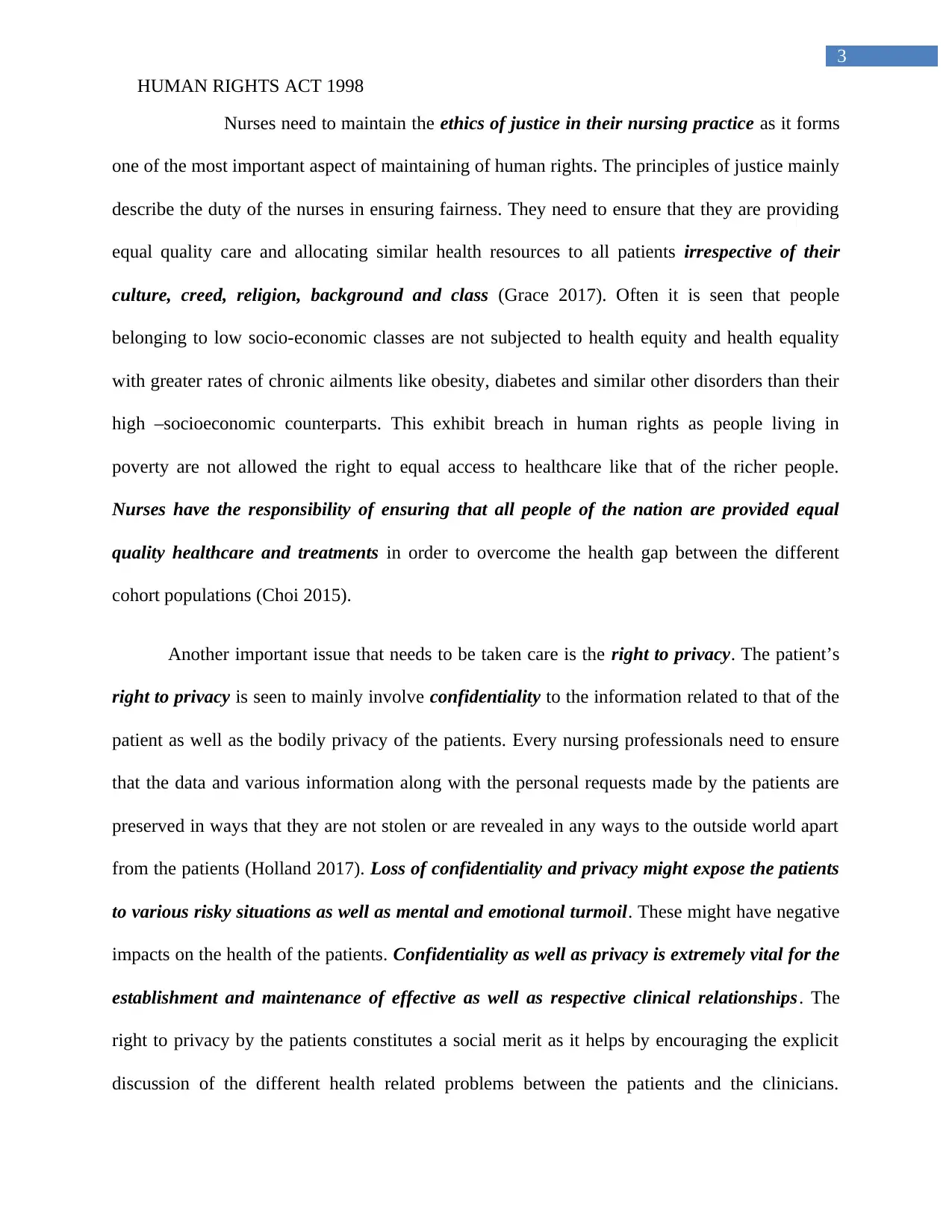
3
HUMAN RIGHTS ACT 1998
Nurses need to maintain the ethics of justice in their nursing practice as it forms
one of the most important aspect of maintaining of human rights. The principles of justice mainly
describe the duty of the nurses in ensuring fairness. They need to ensure that they are providing
equal quality care and allocating similar health resources to all patients irrespective of their
culture, creed, religion, background and class (Grace 2017). Often it is seen that people
belonging to low socio-economic classes are not subjected to health equity and health equality
with greater rates of chronic ailments like obesity, diabetes and similar other disorders than their
high –socioeconomic counterparts. This exhibit breach in human rights as people living in
poverty are not allowed the right to equal access to healthcare like that of the richer people.
Nurses have the responsibility of ensuring that all people of the nation are provided equal
quality healthcare and treatments in order to overcome the health gap between the different
cohort populations (Choi 2015).
Another important issue that needs to be taken care is the right to privacy. The patient’s
right to privacy is seen to mainly involve confidentiality to the information related to that of the
patient as well as the bodily privacy of the patients. Every nursing professionals need to ensure
that the data and various information along with the personal requests made by the patients are
preserved in ways that they are not stolen or are revealed in any ways to the outside world apart
from the patients (Holland 2017). Loss of confidentiality and privacy might expose the patients
to various risky situations as well as mental and emotional turmoil. These might have negative
impacts on the health of the patients. Confidentiality as well as privacy is extremely vital for the
establishment and maintenance of effective as well as respective clinical relationships. The
right to privacy by the patients constitutes a social merit as it helps by encouraging the explicit
discussion of the different health related problems between the patients and the clinicians.
HUMAN RIGHTS ACT 1998
Nurses need to maintain the ethics of justice in their nursing practice as it forms
one of the most important aspect of maintaining of human rights. The principles of justice mainly
describe the duty of the nurses in ensuring fairness. They need to ensure that they are providing
equal quality care and allocating similar health resources to all patients irrespective of their
culture, creed, religion, background and class (Grace 2017). Often it is seen that people
belonging to low socio-economic classes are not subjected to health equity and health equality
with greater rates of chronic ailments like obesity, diabetes and similar other disorders than their
high –socioeconomic counterparts. This exhibit breach in human rights as people living in
poverty are not allowed the right to equal access to healthcare like that of the richer people.
Nurses have the responsibility of ensuring that all people of the nation are provided equal
quality healthcare and treatments in order to overcome the health gap between the different
cohort populations (Choi 2015).
Another important issue that needs to be taken care is the right to privacy. The patient’s
right to privacy is seen to mainly involve confidentiality to the information related to that of the
patient as well as the bodily privacy of the patients. Every nursing professionals need to ensure
that the data and various information along with the personal requests made by the patients are
preserved in ways that they are not stolen or are revealed in any ways to the outside world apart
from the patients (Holland 2017). Loss of confidentiality and privacy might expose the patients
to various risky situations as well as mental and emotional turmoil. These might have negative
impacts on the health of the patients. Confidentiality as well as privacy is extremely vital for the
establishment and maintenance of effective as well as respective clinical relationships. The
right to privacy by the patients constitutes a social merit as it helps by encouraging the explicit
discussion of the different health related problems between the patients and the clinicians.
Paraphrase This Document
Need a fresh take? Get an instant paraphrase of this document with our AI Paraphraser
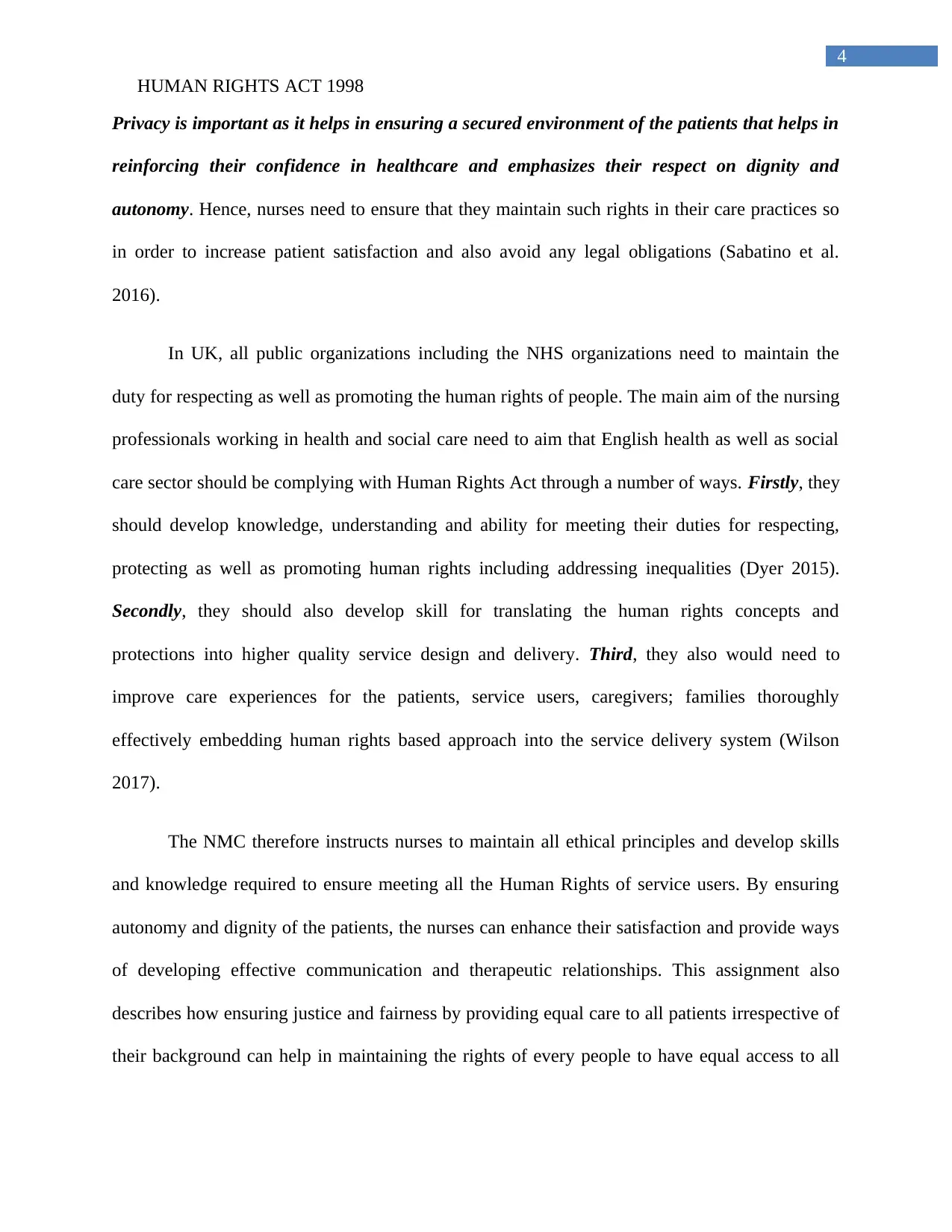
4
HUMAN RIGHTS ACT 1998
Privacy is important as it helps in ensuring a secured environment of the patients that helps in
reinforcing their confidence in healthcare and emphasizes their respect on dignity and
autonomy. Hence, nurses need to ensure that they maintain such rights in their care practices so
in order to increase patient satisfaction and also avoid any legal obligations (Sabatino et al.
2016).
In UK, all public organizations including the NHS organizations need to maintain the
duty for respecting as well as promoting the human rights of people. The main aim of the nursing
professionals working in health and social care need to aim that English health as well as social
care sector should be complying with Human Rights Act through a number of ways. Firstly, they
should develop knowledge, understanding and ability for meeting their duties for respecting,
protecting as well as promoting human rights including addressing inequalities (Dyer 2015).
Secondly, they should also develop skill for translating the human rights concepts and
protections into higher quality service design and delivery. Third, they also would need to
improve care experiences for the patients, service users, caregivers; families thoroughly
effectively embedding human rights based approach into the service delivery system (Wilson
2017).
The NMC therefore instructs nurses to maintain all ethical principles and develop skills
and knowledge required to ensure meeting all the Human Rights of service users. By ensuring
autonomy and dignity of the patients, the nurses can enhance their satisfaction and provide ways
of developing effective communication and therapeutic relationships. This assignment also
describes how ensuring justice and fairness by providing equal care to all patients irrespective of
their background can help in maintaining the rights of every people to have equal access to all
HUMAN RIGHTS ACT 1998
Privacy is important as it helps in ensuring a secured environment of the patients that helps in
reinforcing their confidence in healthcare and emphasizes their respect on dignity and
autonomy. Hence, nurses need to ensure that they maintain such rights in their care practices so
in order to increase patient satisfaction and also avoid any legal obligations (Sabatino et al.
2016).
In UK, all public organizations including the NHS organizations need to maintain the
duty for respecting as well as promoting the human rights of people. The main aim of the nursing
professionals working in health and social care need to aim that English health as well as social
care sector should be complying with Human Rights Act through a number of ways. Firstly, they
should develop knowledge, understanding and ability for meeting their duties for respecting,
protecting as well as promoting human rights including addressing inequalities (Dyer 2015).
Secondly, they should also develop skill for translating the human rights concepts and
protections into higher quality service design and delivery. Third, they also would need to
improve care experiences for the patients, service users, caregivers; families thoroughly
effectively embedding human rights based approach into the service delivery system (Wilson
2017).
The NMC therefore instructs nurses to maintain all ethical principles and develop skills
and knowledge required to ensure meeting all the Human Rights of service users. By ensuring
autonomy and dignity of the patients, the nurses can enhance their satisfaction and provide ways
of developing effective communication and therapeutic relationships. This assignment also
describes how ensuring justice and fairness by providing equal care to all patients irrespective of
their background can help in maintaining the rights of every people to have equal access to all
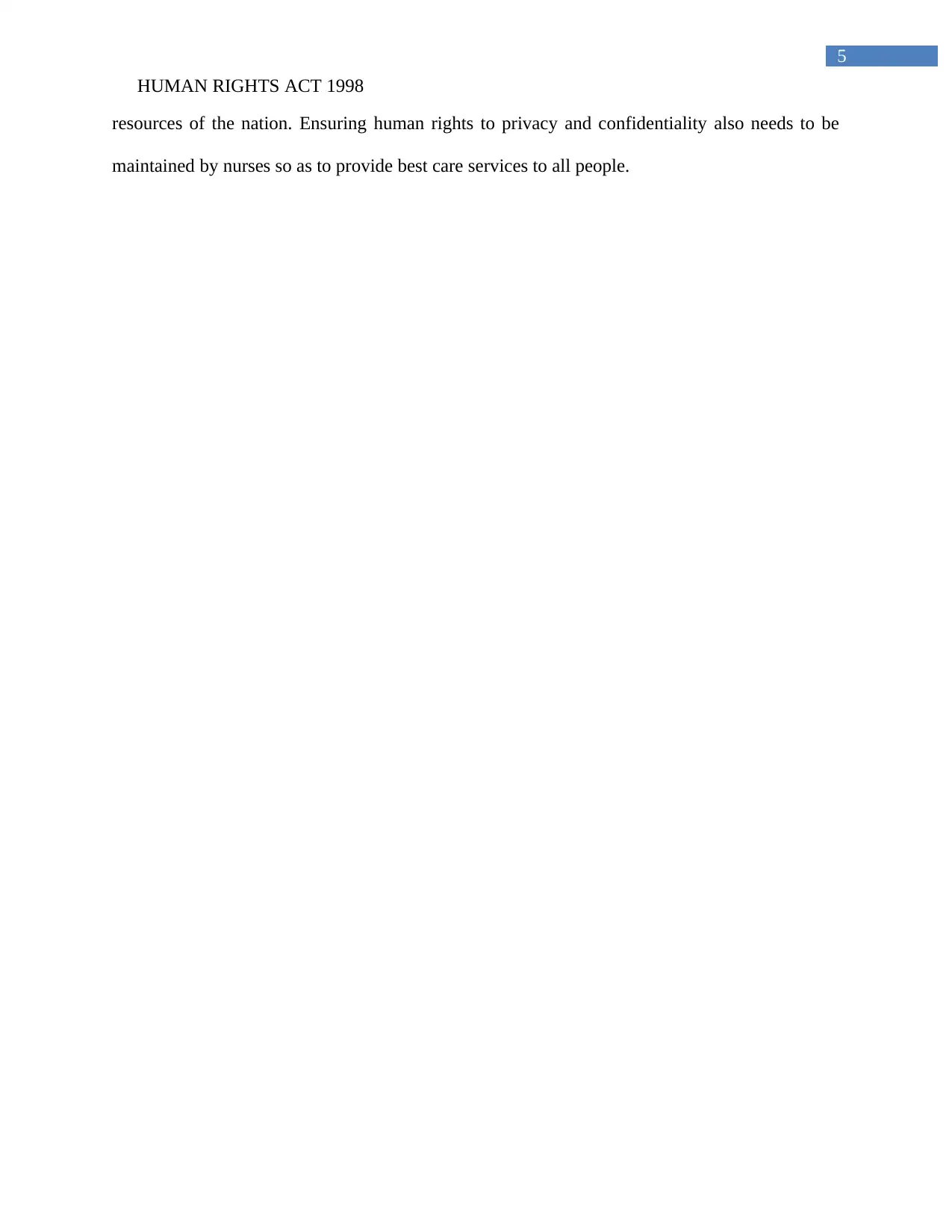
5
HUMAN RIGHTS ACT 1998
resources of the nation. Ensuring human rights to privacy and confidentiality also needs to be
maintained by nurses so as to provide best care services to all people.
HUMAN RIGHTS ACT 1998
resources of the nation. Ensuring human rights to privacy and confidentiality also needs to be
maintained by nurses so as to provide best care services to all people.
⊘ This is a preview!⊘
Do you want full access?
Subscribe today to unlock all pages.

Trusted by 1+ million students worldwide
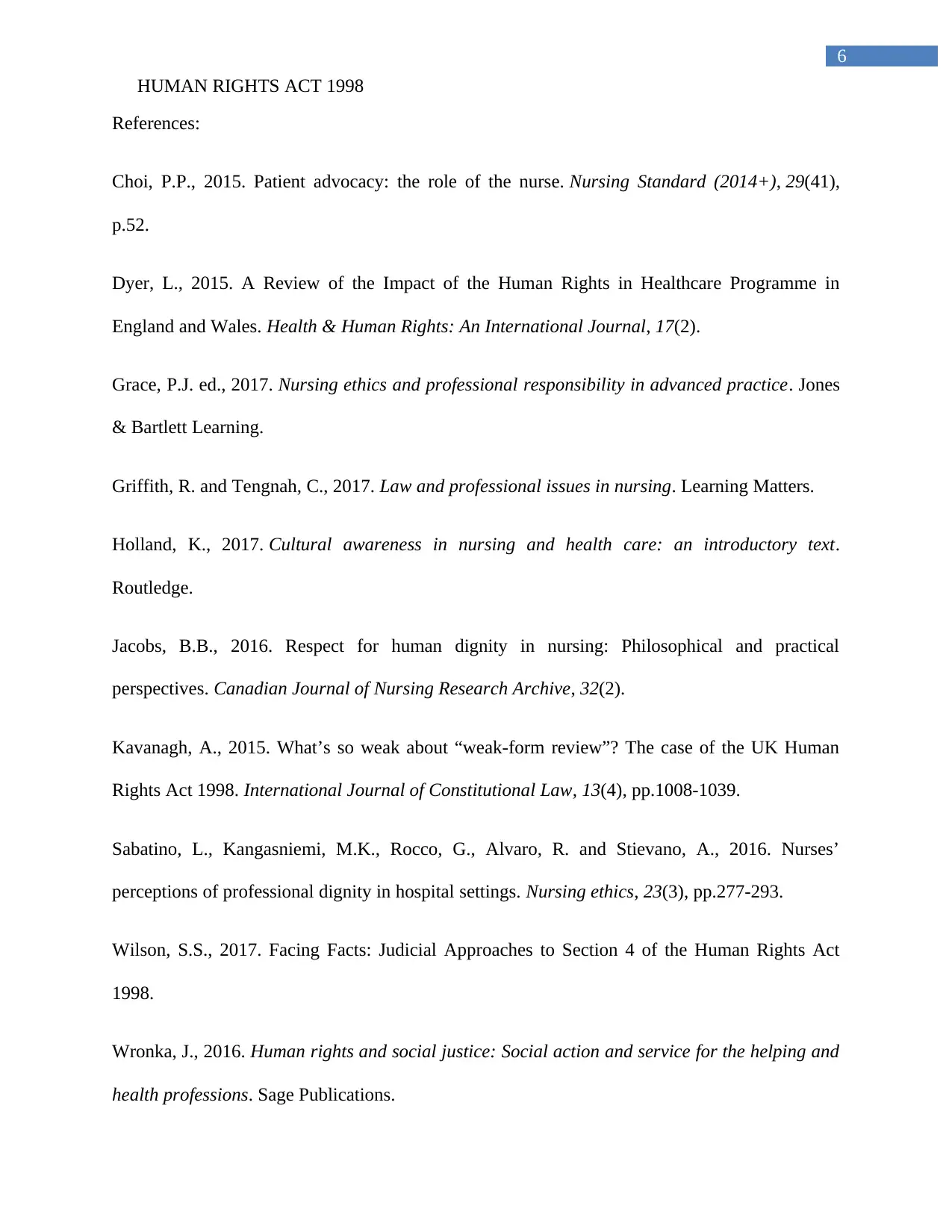
6
HUMAN RIGHTS ACT 1998
References:
Choi, P.P., 2015. Patient advocacy: the role of the nurse. Nursing Standard (2014+), 29(41),
p.52.
Dyer, L., 2015. A Review of the Impact of the Human Rights in Healthcare Programme in
England and Wales. Health & Human Rights: An International Journal, 17(2).
Grace, P.J. ed., 2017. Nursing ethics and professional responsibility in advanced practice. Jones
& Bartlett Learning.
Griffith, R. and Tengnah, C., 2017. Law and professional issues in nursing. Learning Matters.
Holland, K., 2017. Cultural awareness in nursing and health care: an introductory text.
Routledge.
Jacobs, B.B., 2016. Respect for human dignity in nursing: Philosophical and practical
perspectives. Canadian Journal of Nursing Research Archive, 32(2).
Kavanagh, A., 2015. What’s so weak about “weak-form review”? The case of the UK Human
Rights Act 1998. International Journal of Constitutional Law, 13(4), pp.1008-1039.
Sabatino, L., Kangasniemi, M.K., Rocco, G., Alvaro, R. and Stievano, A., 2016. Nurses’
perceptions of professional dignity in hospital settings. Nursing ethics, 23(3), pp.277-293.
Wilson, S.S., 2017. Facing Facts: Judicial Approaches to Section 4 of the Human Rights Act
1998.
Wronka, J., 2016. Human rights and social justice: Social action and service for the helping and
health professions. Sage Publications.
HUMAN RIGHTS ACT 1998
References:
Choi, P.P., 2015. Patient advocacy: the role of the nurse. Nursing Standard (2014+), 29(41),
p.52.
Dyer, L., 2015. A Review of the Impact of the Human Rights in Healthcare Programme in
England and Wales. Health & Human Rights: An International Journal, 17(2).
Grace, P.J. ed., 2017. Nursing ethics and professional responsibility in advanced practice. Jones
& Bartlett Learning.
Griffith, R. and Tengnah, C., 2017. Law and professional issues in nursing. Learning Matters.
Holland, K., 2017. Cultural awareness in nursing and health care: an introductory text.
Routledge.
Jacobs, B.B., 2016. Respect for human dignity in nursing: Philosophical and practical
perspectives. Canadian Journal of Nursing Research Archive, 32(2).
Kavanagh, A., 2015. What’s so weak about “weak-form review”? The case of the UK Human
Rights Act 1998. International Journal of Constitutional Law, 13(4), pp.1008-1039.
Sabatino, L., Kangasniemi, M.K., Rocco, G., Alvaro, R. and Stievano, A., 2016. Nurses’
perceptions of professional dignity in hospital settings. Nursing ethics, 23(3), pp.277-293.
Wilson, S.S., 2017. Facing Facts: Judicial Approaches to Section 4 of the Human Rights Act
1998.
Wronka, J., 2016. Human rights and social justice: Social action and service for the helping and
health professions. Sage Publications.
Paraphrase This Document
Need a fresh take? Get an instant paraphrase of this document with our AI Paraphraser
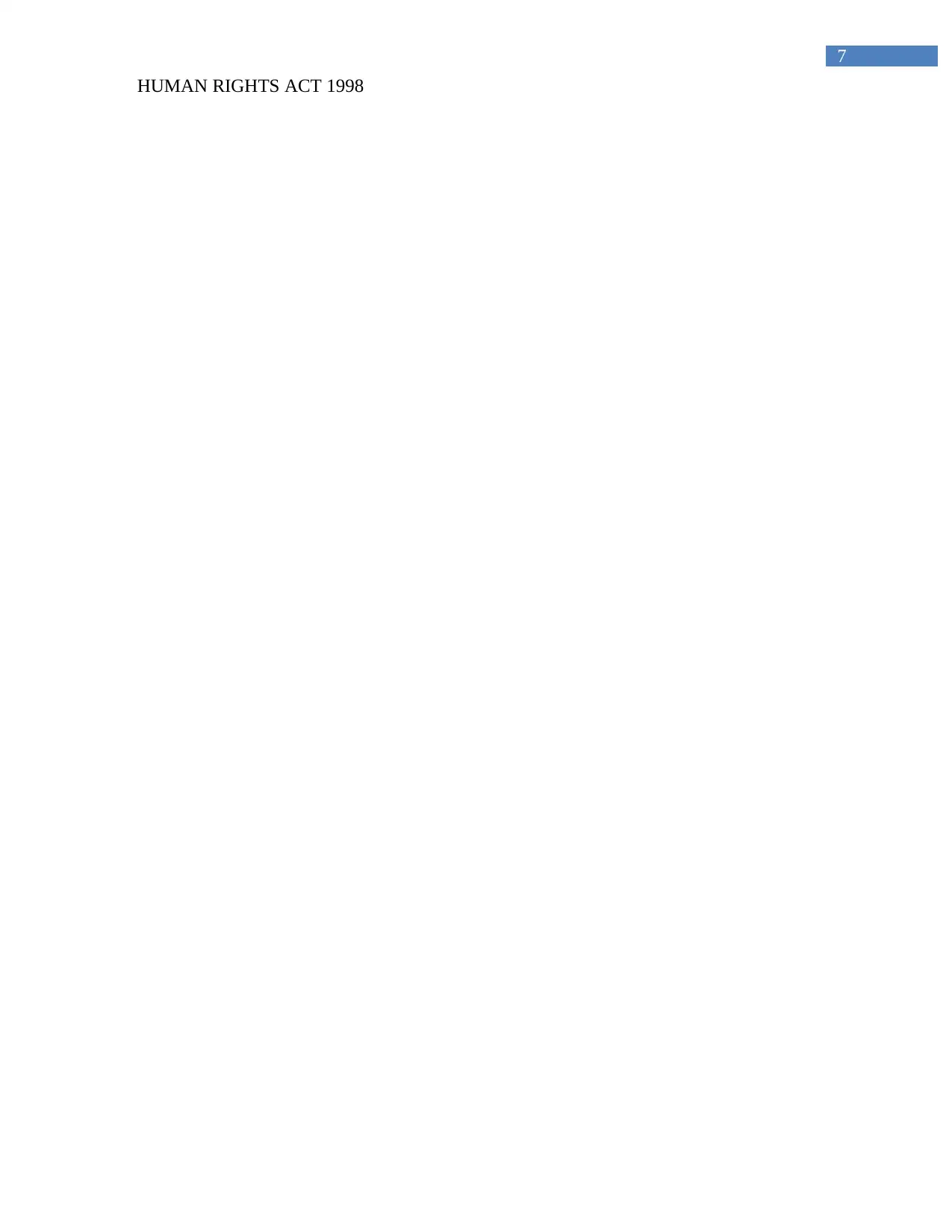
7
HUMAN RIGHTS ACT 1998
HUMAN RIGHTS ACT 1998
1 out of 8
Related Documents
Your All-in-One AI-Powered Toolkit for Academic Success.
+13062052269
info@desklib.com
Available 24*7 on WhatsApp / Email
![[object Object]](/_next/static/media/star-bottom.7253800d.svg)
Unlock your academic potential
Copyright © 2020–2025 A2Z Services. All Rights Reserved. Developed and managed by ZUCOL.





